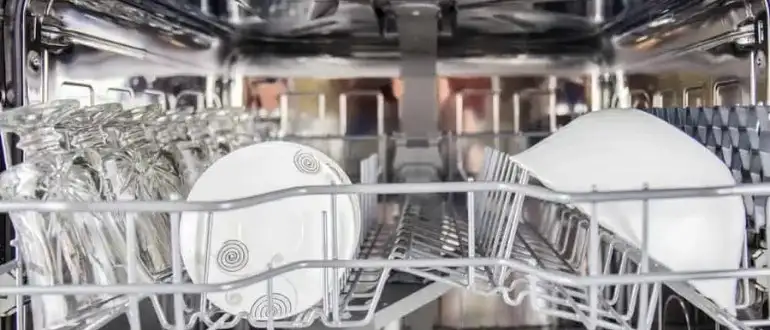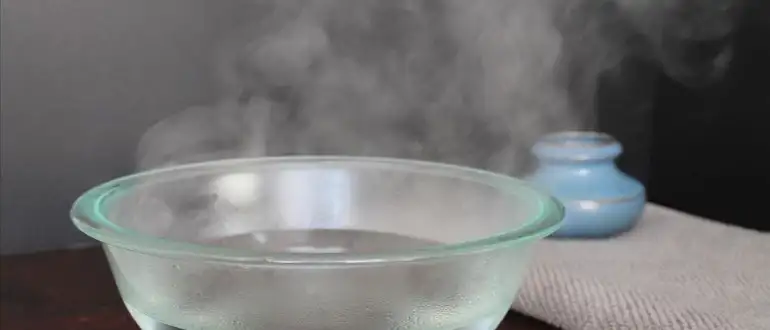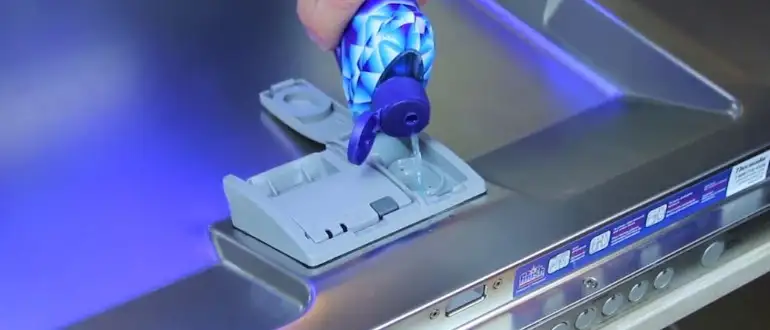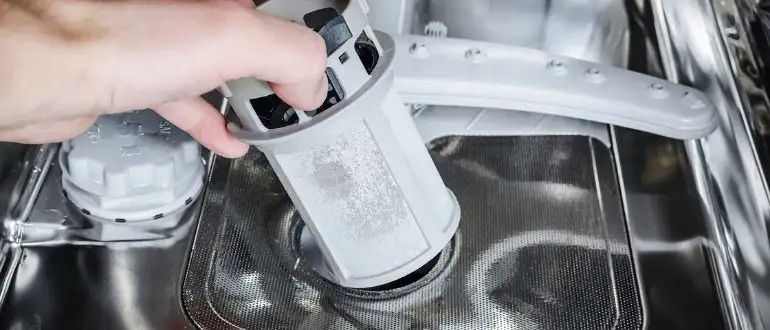People often panic after seeing white residues on dishes after washing in the dishwasher. People are curious to know why it happens? And is that concerning?
Having adequate knowledge about dishwashers is absolutely important to get the best cleaning experience and to keep your dishes in a sound condition.
Read this article to get your answer and a detailed guide to make your washing experience hassle-free and safe.
Why Is My Dishwasher Leaving White Residues?
The possible reason for leaving white residues in your dishes from your dishwasher is limescale or salt. If the residue is wiped off with the finger, it is salt.
If the residue doesn’t remove easily, but if it is removed with vinegar, it is limescale.

How Do Prevent The Formation Of White Residues?
Hard Water
Filmy dishes are kind of guaranteed if you have hard water. Some minerals from the water will remain on the dishes after a wash cycle while using the dishwasher.
This problem will increase as more hard water sublimates in the dishwasher if more minerals are added to the mix.
To fix it quickly, start a wash cycle by emptying the dishwasher. After the dishwasher is filled with water, add two cups of vinegar to the bottom of the dishwasher.
Start the dishwasher again, and allow the vinegar to wash away the built-up minerals. This will help to get rid of white residues on the dishes.
With time, more hard water will sublimate in your dishwasher, and you will again find the white residues. This problem can be permanently solved by a water softener.
Use Hot Water

To properly dissolve the detergent properly, use hot water. The preferable optimum water temperature for most dishwashers is mostly 120℉ to 150℉.
The white residues will again build up if the water is cold because the dishwasher leaves a white residue of undissolved soap.
So, to prevent the formation of white residues, make sure that your water is heated to the optimal temperature.
But it should be noted that the hottest water can dilute too much soap. If the water is hot and still the white residues remain, reduce the amount of detergent you use by 50%.
Gritty Residues From The Dishwasher
If the remaining residues are gritty, then there are possible reasons. One of them is undissolved detergent. This problem is due to powdered detergent and detergent cakes.
But this is not a permanent problem. This problem is called Etching. This problem occurs when the tiny particles of soap scratch the dishes.
If you observe little bumps after running down your fingers in the dishes, then understand that your dishwasher has permanently scratched your dishes.
The solution to this problem is to use liquid detergent, but it will not undo the damage that has been done.
Use Rinse Aid

Rinse aid helps to get rid of residues from the dishwashers. The chemicals present in the rinse aid help to run off the water from the dishes to rinse more effectively.
The more water runs off, the less chance is there to leave white residues on the dishes while drying them.
To get better performance, use citric acid every time using your dishwasher. Citric acid additives. Citric acid works pretty much the same as vinegar.
As a result, it cleans off the deposited hard water and the minerals. Simply add them, and the dishwasher will be cleaned off along with the dishes.
Other Dishwasher Stains And Flaws:
Let’s see what the other places of the dishwasher where the white residues can form are.
Dishes Being Greasy
There are multiple reasons why the dishes come out from the dishwasher with greasy residues/ remnants.
One of the reasons is detergents used are not an effective grease remover. No matter what the manufacturers say, dishwashers will not perform effectively if the dishes are not rinsed at first.
Researching various kinds of detergents and changing them can solve the problem. But bear in mind detergents can put permanent scratches on the dishes.
Another reason could be the temperature of the water is not hot enough, this should be remembered too.
Water Filter

The water filter is used to remove food particles from the water present in the water tub. In some dishwashers, there are multiple stages of water filtration filters too.
Checking the filter regularly or changing the filter or cartridge regularly at least every six months can help solve this issue.
Dishwasher Doors:
The white residues can form in the doors of the dishwashers too.
If you see white residues piled up in the doors, the possible reasons could be using a subpar or too much detergent.
This mainly happens due to the detergents bubbling up during the cycle and overflowing through the outside of the door.
FAQs on dishwasher and white residues:
Is Using Vinegar Harmful To My Dishwasher?
No, it will not damage the dishwasher. In fact, vinegar is an alternative to detergent powders.
But the acidic liquid may react with some parts of the dishwasher over time and can cause the condition of the hoses and rubber to decline.
How Many Times Can I Use Vinegar In My Dishwasher?
Once a month, not more than that.
How Many Times Will My Dishwasher Filter Be Cleaned?
It depends on how frequently you are using your dishwasher.
But you should clean your dishwasher usually once every three to six months.
Why Is My Dishwasher Not Cleaning Properly?
The possible reason could be food clogged in the filter.
If the filter is clogged, the dishwasher re-circulates the dirty water, which results in a bad smell from the dishes.
Final words:
There are multiple reasons why the dishwasher is leaving white residues. Please go through your user manual properly for any problems you face.
Because nobody knows your dishwasher better than the manufacturer.
To avoid residues from piling up, use vinegar or liquid detergent. No matter what the manufacturer claims, always pre-rinse your dishes.
Lastly, ensure proper cleaning of your filter at regular intervals.

